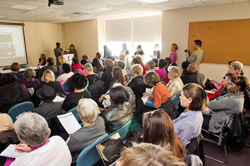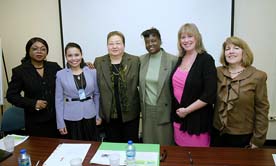CSW56 Summary 2012
CSW56 Priority Theme: The empowerment of rural women and their role in poverty and hunger eradication, development and current challenges
BONNIE BERRY, WFWP UN REPRESENTATIVE
FEBRUARY 27- MARCH 9, 2012 - UNHQ, NEW YORK
WFWPI Summary Report
Daily briefings were organized and facilitated by the NGO/CSW Committee, not just from NY, but representatives from Vienna and Geneva presided, including WFWPI's UN Office Deputy Director, Carolyn Handschin, who also co-facilitated one of the newly formed conversation circles, on the theme of Human Rights. Staffers from UN Women reported each day on the formal proceedings at CSW, and progress on the agreed conclusions outcome document.
Formal sessions focused on national reports about the progress and challenges faced by rural women, in both the developing and the developed worlds. Concerns were expressed from many member state delegations and ngo representatives alike, such as lack of land rights for women, violence against women, particularly domestic violence, lack of education, men and boys are given preference for tools and resources for agriculture, the main source of income in rural areas. Yet women and girls perform a significant portion of agricultural work and produce a significant percentage of crops as well. Another significant issue is the impact of climate change on rural women and girls, who often are not warned about pending natural disasters and are ill equipped to face the aftermath. This issue will receive much more attention at the upcoming Rio+ 20 Conference on Sustainable Development to be held in June 2012.
Regional Caucuses met to brainstorm about the outcome document and gaps in the language that articulates the issues for rural women and the commitments by member state delegations to address these gaps. This year, the Europe and North America caucuses were combined, which lent focus and allowed North American NGO representatives to gain exposure to the very organized and inclusive European NGOs. Caucuses focused not only on input to the outcome document, but also on identifying representatives to attend a meeting at the invitation of UN Women, now one year old, to discuss how NGOs would interface with the organization as it develops its organizational and outreach structures.
NGOs organized and presented a wide array of parallel events that ranged from the UN Foundation's panel on its newly released report: Girls Grow to Femme's Africa's Soliditaire panel informing on the predicament, both progress and challenges of rural women and girls in Africa; to panels on Women's Leadership Development. Opportunities to learn, network and expand one's horizons abound. WFWPI's delegation took full advantage of opportunities to attend the formal proceedings of CSW, parallel events sponsored by Member States and UN Agencies as well as the NGO sponsored parallel events. The presence of UN Women staffers also added an educative focus to daily briefings which lent focus to the advocacy and interventions of the NGO representatives, including WFWPI's delegation.
The ongoing renovations at the UN Headquarters continued to challenge NGO participation due to the severely limited access to the meeting rooms where the official events and Member State parallel events were held. WFWPI sincerely hopes that the UN CSW organizers will show good faith following renovation completions and provide the open access that NGOs in Consultative Status need to fulfill their responsibilities to be active observers and participants in the formal CSW process.


